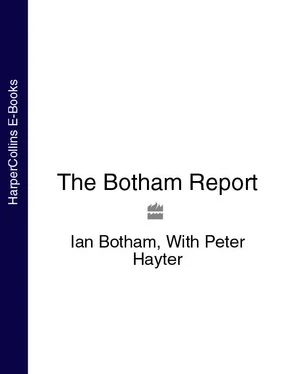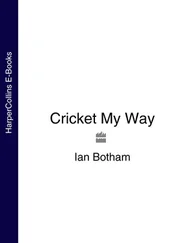It had started so brightly. Mike Gatting’s success in leading England to victory on the 1986–87 tour down under represented a tremendous personal achievement. Written off as ‘can’t bat, can’t bowl, can’t field’ no-hopers during the warm-up matches, we stuffed those words down the throats of our critics once the serious business started and won the Test series 2–1. There is no doubt that Gatting’s captaincy was a major factor in the transformation.
Emphatically a player’s captain, Gatt understood right from the start that if you treat cricketers like adults, giving them enough leeway when appropriate and a few hard words when necessary, you are far more likely to gain their confidence and get the best out of them rather than by simply attempting to impose your will on them. Even when early results tended to suggest otherwise, he knew that there was no cause for alarm and certainly no need to panic, and he was comfortable with the knowledge that, in terms of preparation, most senior Test players know what is best for them and don’t need telling. Our results, winning the Ashes and the World Series competition, spoke for themselves.
Yet within little over a year after we returned from that wonderful tour, Gatting had been sacked and the England team thrown into turmoil. A year and a bit later he made the decision to turn his back on the England team by signing up for the 1989–90 ‘rebel’ tour to South Africa. The story of how Gatt fell from grace underlines the confusion and lack of leadership from the top that dogged our national summer game for the best part of a decade.
Ever since Ted Dexter led the first England party to tour Pakistan in 1961–62, there had been rumblings of discontent over the standards and motives of the home umpires. England won the first Test ever played between the two countries in Pakistan, but from that initial success until the present day, we have never won there again. Prior to England’s 1987 tour, no player or official had ever spoken out publicly on the subject, but a succession of England touring parties had considered this more than mere coincidence.
The build-up to the eruption that occurred at Faisalabad in the second Test of that 1987 tour had started during Pakistan’s visit to England to play five Tests during the previous summer.
The trouble began even before a ball was bowled, when the Pakistan team, through their manager Haseeb Ahsan, officially objected to the TCCB over the presence on the Test umpiring panel of Ken Palmer and David Constant. Constant had been in the bad books of the Pakistan captain Imran Khan ever since their previous visit to England in 1982, when Imran believed he made a poor decision in the deciding Test of a three-match series at Headingley that he was convinced cost his side the match.
I happened to be batting at the time the incident occurred. After having bowled Pakistan out for 275, we were heavily in the mire at 77 for four with Imran himself bowling beautifully in conjunction with their leg-spin wizard Abdul Qadir. I decided that the best form of defence was attack and took on Qadir and my approach paid off as I made 57 out of a stand of 69 with David Gower in just over an hour. My efforts to break free of the Pakistan stranglehold were frustrating for Imran and his players, and their mood was not helped when Qadir felt certain he had found the edge of Gower’s bat for a catch behind when he had made only seven. Had Gower gone then, Pakistan might well have seen off the tail and gone on to force victory. But Constant turned down huge appeals, Gower survived to make 74 and drag us to 256. I then took five wickets in their second innings of 199 and, set 219 to win, we got there by the narrow margin of three wickets, thanks in no small measure to the forty-two extras contributed by the Pakistan attack.
From where I was standing I honestly was not certain whether Gower had hit the ball or not, and neither, I am sure, could Constant have been. If he made a mistake, it was a genuine error, the kind that all umpires make because they are human. Imran saw it differently, as evidence, in effect, that he and his side were cheated by biased umpiring. Afterwards Imran hit out at Constant, claiming the decision had cost his side the match, and he carried those thoughts with him for the next five years.
What really riled Imran in 1987 was that although the TCCB had agreed to a request by the Indians, in that same summer of 1982, to have Constant taken off the list for their three-Test series with England, when the Pakistan management made the same request now they flatly refused on the grounds of prejudice. To a certain extent I can understand Imran’s feelings. Although it may have been feeble of the Board to bow to India’s wishes in 1982, not to comply with the Pakistan request was at best inconsistent and illogical and at worst bound to inflame any perceived sense of injustice they may have harboured.
The news of what had happened was leaked during the second Test at Lord’s, in which Constant was standing and he stood again in the final match at The Oval. Both times Haseeb Ahsan publicly criticised Constant over his umpiring and at one stage described him as ‘a disgraceful person’.
But this was by no means the only spark of controversy in a series that left everyone with a nasty taste in the mouth. Off the field there was trouble at Edgbaston during the third one-day international when some idiots, fuelled by booze and racial prejudice, fought with Pakistani youths on the terraces. Then in the first Test at Old Trafford, a rain-ruined match going nowhere, Pakistan managed to bowl 11 overs in an hour after tea on the second day. When Micky Stewart, the manager, commented on this, Imran reacted by saying: ‘We get slagged off and called cheats and I object to that.’ Then came the incidents at Headingley that some might say seemed to support the description Imran objected to. Both involved the Pakistan wicket-keeper Salim Yousuf.
After bowling us out for 136 in our first innings, Pakistan made 353 in reply. Chris Broad, whose batting in Australia the previous winter was a huge feature in our success, played at Imran’s second delivery and the ball brushed his left hand after he had removed it from the bat handle. The laws state that the hand has to be in contact with the bat for a catch to be given. Without the benefit of television replays the appeal from the bowler was probably made in good faith, but what made the dismissal so unsatisfactory from England’s point of view was that replays of the catch itself clearly showed that the ball bounced fractionally before arriving in Yousuf’s gloves. Still, no one was too put out at this stage. Sometimes keepers and slip fielders genuinely do not know whether or not the ball has arrived on the bounce and, when considering whether a guy has attempted to deliberately pull a fast one, most players will give the fielder or keeper the benefit of the doubt. There was no doubt at all, however, over Yousuf’s actions some time later. I edged a short delivery and instantly and instinctively looked around to follow the flight of the ball. I could see quite clearly that Yousuf dropped the ball, scooped it up again after it had hit the ground, then claimed the catch. I’m not proud of what I said to him, but it was a knee-jerk reaction in the heat of the moment. I called him, to his face, a cheat, although there might also have been a couple of adjectives thrown in for good measure. The umpire Ken Palmer intervened and had his say and I fully expected Imran to admonish his player for such a blatant offence which, after all, reflected no credit on him as captain. Nothing was forthcoming from Imran, although he did claim later that he would have reprimanded Yousuf had I not sworn at him!
All in all we were more than happy when the series was brought to a close, though disappointed with the 1–0 defeat, and in hindsight it would have been better all around had there been a cooling-off period of a few seasons before we met up again.
Читать дальше












